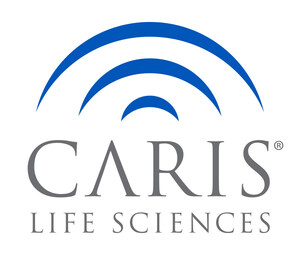Large Studies Show Caris Molecular Intelligence™ Identifies Targets with Therapeutic Implications to Help Physicians Select Regimens to Manage Patients with Lung Tumors
Presentations at 2014 Chicago Multidisciplinary Symposium on Thoracic Oncology Point to Potential Strategies for Treatment of Small Cell, Non-small Cell, and Neuroendocrine Lung Cancers
IRVING, Texas, Oct. 30, 2014 /PRNewswire/ -- Caris Life Sciences today announced the presentation of data from two large studies in which Caris Molecular Intelligence™, the company's panomic, comprehensive tumor profiling service, facilitated the molecular analysis of lung tumors. The biomarker findings from the two data sets, presented at the 2014 Chicago Multidisciplinary Symposium on Thoracic Oncology, have potentially important therapeutic implications for management of patients with small cell lung cancer (SCLC), non-small cell lung cancer (NSCLC), and neuroendocrine tumors (NETs) of the lung, as well as for identifying potential mechanisms of drug resistance.
Both studies utilized Caris Molecular Intelligence's multi-technology approach, which included gene sequencing (next-generation [NGS] or Sanger sequencing), protein analysis (immunohistochemistry [IHC]), and gene copy number analysis (chromogenic and fluorescent in situ hybridization [CISH and FISH]). One study, presented during an oral abstract session, highlighted the genomic heterogeneity of SCLC and lung NETs, based on identification of genomic alterations and driver mutations in multiple genes of interest. The other study, presented as a poster, assessed concurrent aberrations of NSCLC biomarkers that may account for drug resistance as well as indicate potential strategies for combination therapies that may benefit specific patient cohorts.
"The studies presented at the Chicago Thoracic Oncology symposium underscore the importance of comprehensive, multiplatform molecular profiling as a tool to fully characterize and elucidate oncogenic drivers in lung cancers. This is particularly relevant as the NCCN guidelines have been updated this year to reflect the need for multiplex testing as the replacement for simply testing EGFR and ALK alone," said Sandeep K. Reddy, M.D., chief medical officer at Caris Life Sciences. "In both studies, Caris Molecular Intelligence enabled detection of protein, gene copy number, and genetic alterations in lung tumors, information that may aid in the personalization of treatment strategies for common as well as relatively rare subtypes of lung cancer."
SCLC/NET Study highlights
In an oral presentation today, researchers presented molecular profiling results from a large cohort of 607 lung tumor samples, consisting of 375 SCLC samples and 232 samples from lung NETs (including carcinoid, atypical carcinoid, and large-cell NETs). Although there were no consistent findings, apart from p53 alterations, in these genomically heterogeneous tumor populations, the researchers identified select mutations within these histologic subtypes that may be targetable.
Specifically, sequencing data from lung NETs identified genomic alterations in several genes including TP53 (34%); PTEN (9%); HRAS (7%); ATM, KRAS, and FGFR2 (5-6%); and APC, EGFR, HNF1A, JAK3, KDR, MLH1, PIK3CA, and RB1 (3%). Sequencing data from SCLC samples revealed a wider spectrum of mutations, with variants detected in TP53 (57%); RB1 (11%); ATM, cMET, and PTEN (6-7%); BRAF, SMAD4, and KRAS (3-4%); and ABL1, APC, CTNNB1, EGFR, FBXW7, FGFR2, HNF1A, HRAS, JAK3, MLH1, and PIK3CA (1-2%). The investigators reported amplification of EGFR in 11% (5/46) of SCLC samples, with no amplification of cMET or HER2. Lung NETs displayed amplification in EGFR (12%, 14/104), cMET (6%, 3/50), and HER2 (3%, 2/64).
"Historically, there has been a lack of clarity surrounding the role of molecular profiling in managing lung NETs and SCLC, due in part to oncologists' limited experience with these less common tumors," noted Stephen V. Liu, M.D., assistant professor of medicine in the Department of Hematology/Oncology at Lombardi Comprehensive Cancer Center at Medstar Georgetown University, and lead author of the SCLC/NET study. "Our data support the use of comprehensive molecular analysis for a broader subset of patients with lung tumors. In particular, mutations in EGFR, BRAF, MET, and FGFR2 may have important therapeutic implications for patients with these tumor subtypes."
NSCLC Study highlights
In one of the largest analyses in the U.S. of NSCLC biomarkers (comprising 6785 cases), researchers examined concurrent aberrations of biomarkers in an effort to identify patient cohorts that may benefit from combination therapy. As reported in today's poster session, two-thirds (66%; 63/96) of EGFR-mutated samples that underwent IHC analysis also overexpressed MET, and 7% (6/90) of EGFR-mutated samples subjected to CISH were also MET-amplified, suggesting a potential benefit from dual targeting of EGFR and MET.
Researchers in this study observed ALK translocations in 2.8% (101/3611) of patients. Of these ALK-positive cases, 19% (7/36) also had EGFR amplification and 3% (1/29) had MET amplification, suggesting potential benefit from combining crizotinib with agents such as cetuximab or onartuzumab.
About Caris Life Sciences and Caris Molecular Intelligence™
Caris Life Sciences is a leading biosciences company focused on fulfilling the promise of precision medicine through quality and innovation. Caris Molecular Intelligence™, the industry's leading tumor profiling service, provides oncologists with the most potentially clinically actionable treatment options available to personalize cancer care today. Using a variety of advanced and validated technologies, which assess relevant biological changes in each patient's tumor, Caris Molecular Intelligence correlates biomarker data generated from a tumor with biomarker-drug associations supported by evidence in the relevant clinical literature. The company is also developing a series of tests based on its proprietary Carisome® TOP™ platform, a revolutionary blood-based testing technology for diagnosis, prognosis, and theranosis of cancer and other complex diseases. Headquartered in Irving, Texas, Caris Life Sciences offers services throughout Europe, the U.S., Australia and other international markets. To learn more, please visit www.carislifesciences.com.
SOURCE Caris Life Sciences
Related Links
http://www.carislifesciences.com
WANT YOUR COMPANY'S NEWS FEATURED ON PRNEWSWIRE.COM?
Newsrooms &
Influencers
Digital Media
Outlets
Journalists
Opted In





Share this article